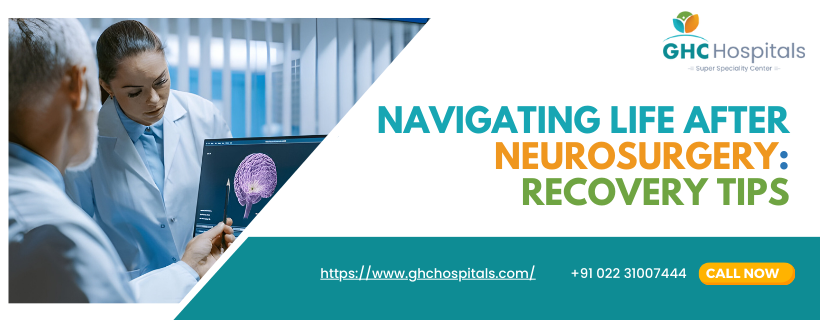Undergoing neurosurgery is a significant milestone, and the journey to recovery can be both challenging and rewarding. At GHC Hospitals, a leading multispecialty hospital, we are dedicated to providing our patients with comprehensive care that extends beyond the operating room. In this article, we offer valuable insights into the recovery process after neurosurgery, with tips on rehabilitation, mental health, and inspiring patient stories that highlight the resilience and determination of those who have walked this path.
Understanding the Recovery Process After Neurosurgery
Recovery after neurosurgery varies greatly depending on the type of surgery, the patient’s overall health, and the complexity of the condition being treated. However, there are common stages and considerations that most patients will experience during their recovery journey.
-
Immediate Postoperative Care:
After surgery, patients are typically monitored in an intensive care unit (ICU) to ensure their vital signs are stable. The immediate postoperative period is crucial for preventing complications such as infections, bleeding, or swelling in the brain. At GHC Hospitals, our team of experienced neurosurgeons and nurses work closely to provide round-the-clock care during this critical phase.
-
Hospital Stay and Initial Recovery:
Depending on the complexity of the surgery, patients may need to stay in the hospital for several days or weeks. During this time, they will begin physical therapy and other forms of rehabilitation to regain strength and mobility. Pain management, wound care, and monitoring for any signs of complications are key components of this phase.
-
Transitioning Home:
Once the patient is stable and able to manage basic activities, they are discharged from the hospital. However, the recovery process continues at home, where patients must follow specific instructions regarding medication, activity levels, and follow-up appointments. It’s essential to have a strong support system in place during this time.
Tips for a Successful Recovery After Neurosurgery
Recovering from neurosurgery requires patience, persistence, and a proactive approach to rehabilitation. Here are some practical tips to help patients navigate this crucial phase of their journey.
-
Follow Your Doctor’s Instructions:
Adhering to the guidance provided by your neurosurgeon is vital for a smooth recovery. This includes taking prescribed medications, attending follow-up appointments, and following any activity restrictions. Patients should also be vigilant about monitoring their symptoms and reporting any concerns to their healthcare team.
-
Prioritise Rest and Sleep:
The brain needs time to heal after surgery, and rest is an essential part of the recovery process. Ensure you get plenty of sleep and avoid activities that could cause fatigue or stress. Creating a calm and comfortable environment at home can promote better rest.
-
Engage in Physical Therapy:
Physical therapy is a cornerstone of recovery after neurosurgery. It helps restore strength, balance, and coordination, and can prevent complications such as blood clots. Work closely with your physical therapist to set achievable goals and track your progress.
-
Focus on Nutrition:
A balanced diet rich in nutrients is essential for healing. Ensure your meals include plenty of fruits, vegetables, lean proteins, and whole grains. Staying hydrated is also crucial for overall health and recovery.
-
Support Your Mental Health:
The emotional toll of neurosurgery can be significant. Patients may experience feelings of anxiety, depression, or frustration during their recovery. It’s important to seek support from mental health professionals, join support groups, or talk to loved ones about your feelings.
-
Stay Active, But Pace Yourself:
While rest is important, so is staying active within your limits. Gentle activities like walking or light stretching can promote circulation and prevent stiffness. Gradually increase your activity level as advised by your healthcare team.
-
Practice Mindfulness and Relaxation Techniques:
Stress can hinder the recovery process, so it’s helpful to incorporate relaxation techniques into your daily routine. Practices such as deep breathing, meditation, or gentle yoga can help manage stress and promote healing.
Conclusion: Embracing Life After Neurosurgery
Recovering from neurosurgery is a journey that requires strength, patience, and support. At GHC Hospitals, we are committed to guiding our patients through every step of this process, providing comprehensive care that addresses both physical and emotional needs. By following the recovery tips outlined in this article and drawing inspiration from the stories of others who have overcome similar challenges, patients can navigate life after neurosurgery with confidence and hope.
If you or a loved one is preparing for or recovering from neurosurgery, GHC Hospitals is here to help. Contact us today to learn more about our neurosurgical services, rehabilitation programs, and patient support resources. Together, we can make the journey to recovery a successful and fulfilling one.

